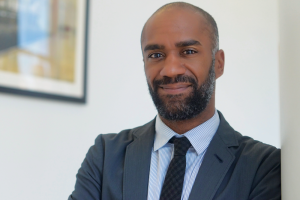Technology is fundamentally changing the world in which today’s law students will launch their careers. It may precipitate complicated new legal issues, exacerbate current concerns about privacy, civil rights, and economic disparity.
Fordham Law faculty and students are studying how lawyers and the law can ensure that technology serves the common good, respects the rights of individuals, and promotes liberty. Here are some of their experiences, in their own words.
 Teaching How to Adapt the Law to Issues Like Data Ownership
Teaching How to Adapt the Law to Issues Like Data Ownership
Joel Reidenberg, Stanley D. and Nikki Waxberg professor of law and founding academic director of the Center on Law and Information Policy at Fordham Law School
“We need to be asking ourselves where new technologies fit within the current legal framework and how that framework has to adapt, what that means for society, and how we respond to it in law. Data governance, for instance, is a critical issue and one we’re only just starting to look at. We need to think about who owns the data, who controls how it’s used, and who gets to make those decisions.
While we’re not going to teach students to be technologists, we can teach them how to interact with technologists to understand how various developments impact law and society. The language they learn in our new coding course for lawyers, for instance, may be obsolete in 10 years. But by demystifying how technology works so students aren’t paralyzed with fear, they’ll be able to think and speak intelligently about it for the rest of their careers.”
 Drafting Regulations for New Technologies Like Blockchain
Drafting Regulations for New Technologies Like Blockchain
Donna Redel ’95, adjunct professor of law at Fordham as well as a fintech investor, board member of the New York Angels, and former managing director of the World Economic Forum
“Blockchain technology is changing and influencing industries as well as the law. One of the interesting things about this new technology, from a legal perspective, is that startups are using it to raise money and create new instruments. Now, traditional banking, industrial, and Fortune 100 clients are also employing the technology and new instruments. So, the question becomes ‘How does our regulatory framework take these new instruments and their underpinning technology into account?’
It is important for lawyers to be able to work with their clients to determine where the bright lines and gray areas are to figure out a course of action. There are lots of differing viewpoints and my students are exposed to many of these viewpoints and key industry practitioners during the semester.
An added benefit: Young people are not afraid to learn new technologies, so they can jump up a lot of rungs in a law firm by having both an understanding of them and how the law may apply.”
 Using the Law to Redress Concentrated Power Online
Using the Law to Redress Concentrated Power Online
Olivier Sylvain, Fordham Law professor and director of the Donald McGannon Communication Research Center at Fordham University
“Fordham is about putting ethics at the center of how and what lawyers do. Indeed, lawyers are essential to redressing inequality online. In particular, they can focus on the ways in which information flows actively perpetuate harm and injury. (Consider that until recently, Facebook allowed advertisers to limit the audiences who would see ads.)
The truth is, we used to believe that online intermediaries disaggregate power. But as information technologies become more embedded in our lives and everything becomes interconnected and administered by just a couple of big tech firms, it has become clear that’s not the case.”
 Investigating How Technology Influences Justice
Investigating How Technology Influences Justice
Daria Brosius ’20, a Stein Scholar and a digital civil rights and civil liberties research intern for Fordham Law Professor Catherine Powell
“Technological advances and a federal government increasingly untethered to the rule of law make digital rights—which extend human rights protections to new technologies and the Internet—an urgent issue in need of legal action. Heightened government access to our information can suppress people’s ability to exercise their constitutional rights and undermine our essential liberties.
Lawyering in the service of others requires us to examine how technology affects justice. But it is not enough for us to be conversant about digital rights. We have to understand how technology is influenced by and influences our identities and biases, especially since there can be a false sense of objectivity that comes from using technology. It can be weaponized by the powerful and the privileged. It can also be a force for justice. We have the opportunity to join this fight.”

